AACR 2025 Rogel Recap
Media contact: Ananya Sen, 734-764-2220 | Patients may contact Cancer AnswerLine™ 800-865-1125
The 2025 American Association of Cancer Research Annual Meeting was held in Chicago, Illinois, in April. Over 70 Rogel Cancer Center researchers participated in presentations, poster sessions and as session moderators to an international audience of cancer researchers. Check out the highlights from this year’s meeting.
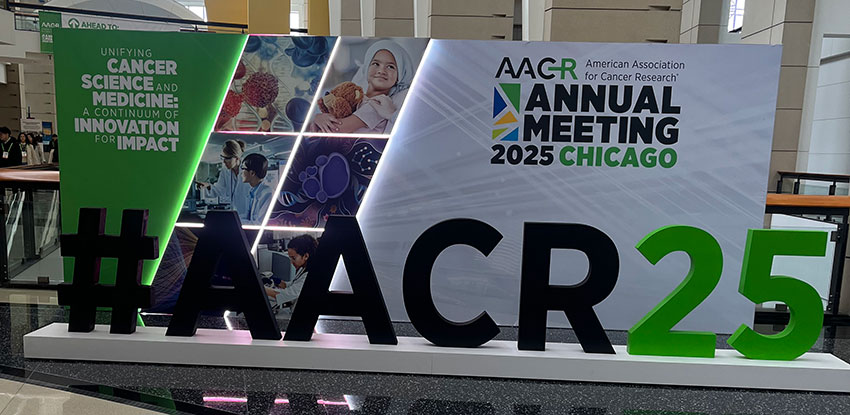
Photo credit: Michigan Medicine
Nathan Merrill, Ph.D., research assistant professor of internal medicine, presented a poster on a precision-medicine-platform in breast cancer to better pair the right patients with the right therapies.
John Prensner, M.D., Ph.D., assistant professor of pediatrics, gave a talk on the cancer dark proteome and how his lab studies unknown proteins for their power and therapeutic importance in cancer.
Mats Ljungman, Ph.D., professor of radiation oncology, presented his work on KLIPP, a CRISPR-based technology that his group uses to target fusion oncogenes and extrachromosomal DNA, leading to loss of cancer cell survival.
Toshiro Hara, Ph.D., assistant professor of neurosurgery, talked about the molecular and cellular basis of tumor-microenvironment interactions in brain tumors using both experimental tools and clinical insights.
Weiping Zou, M.D., Ph.D., professor of pathology, presented his lab’s work on how a type of cell death, called ferroptosis, affects immune responses in the tumor microenvironment and how this could be used to develop novel therapies against cancer.
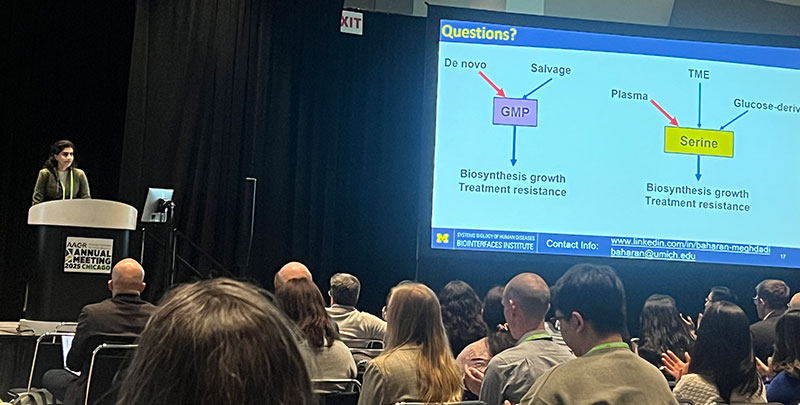
Baharan Maghdadi presenting her research at the AACR 2025
Photo credit: Michigan Medicine
Baharan Meghdadi, a graduate student in Deepak Nagrath’s group, presented her work on creating a model that can enable administration of highly effective personalized metabolic treatments for glioblastoma patients.
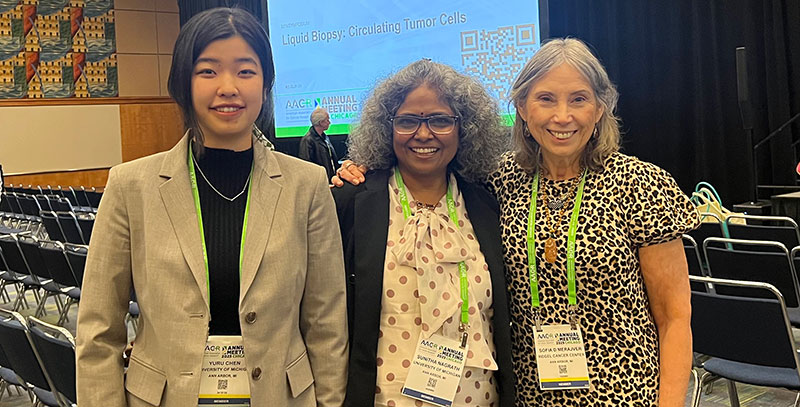
Yuru Chen (far left) stands with Sunitha Nagrath, Ph.D. (center) and Sofia Merajver, M.D., Ph.D. at AACR 2025
Photo credit: Michigan Medicine
Yuru Chen, graduate student in Sunitha Nagrath’s lab, presented at a minisymposium and talked about how circulating tumor cells can be used for tumor characterization, prognosis, and monitoring.
Neha Nagpal, also a graduate student in Sunitha Nagrath’s lab, presented a poster on the prognostic value of liquid biopsies and circulating tumor cells in ductal carcinoma in situ. Her work was one of the projects that was funded by Rogel’s Forbes Institute for Cancer Discovery that supports bold new ideas with big potential to impact cancer treatment.
Sanjana Eyunni, graduate student in Abhijit Parolia’s and Arul Chinnaiyan’s labs , gave
a talk about how mutations in FOXA1 drive prostate cancer. By mapping these mechanisms, the group aims to identify vulnerabilities for targeted therapies.
Rogel researchers share their work at AACR 2025, featuring Mats Ljungman, Sanjana Eyunni, Neha Nagpal, Yuru Chen and Nathan Merrill.
We also asked Rogel trainees and faculty to see what they were excited about at this year’s conference. Here’s what they had to say:
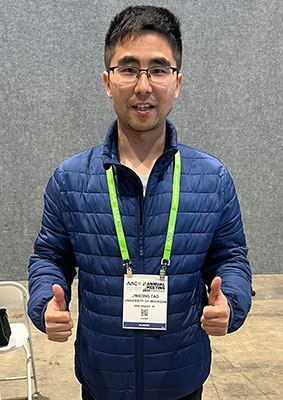
Jinsong Tao
“It is truly inspiring to witness the rapid progress in cancer research, which not only deepens my own scientific perspective but also helps expand the scope of my research.” – Jinsong Tao, research fellow in Duxin Sun’s lab.
“AACR meeting brings together cancer researchers from all over the world to present the latest discoveries in a comprehensive way.” – Shaomeng Wang, Ph.D., professor of internal medicine.
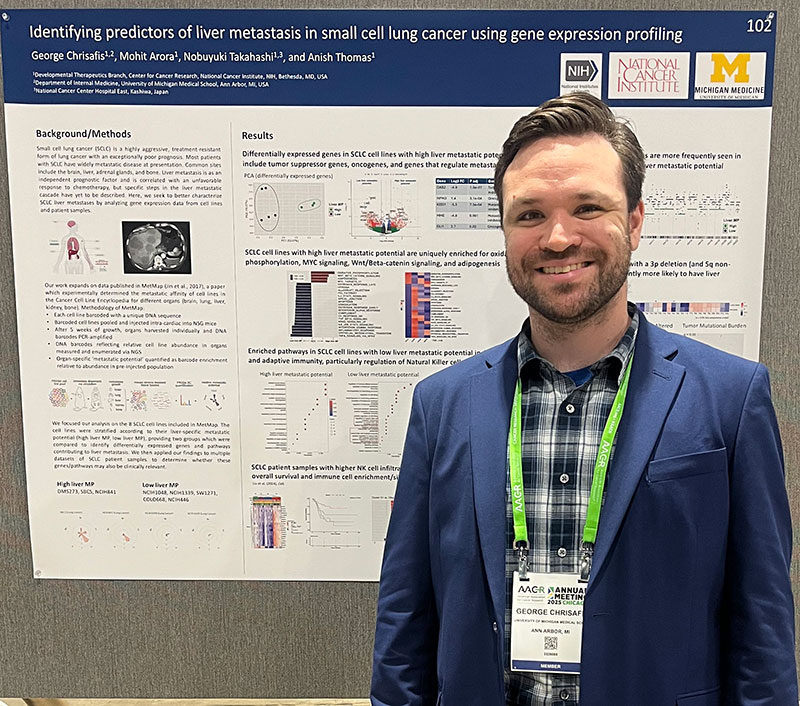
George Chrisafis, M.D.
“The AACR Annual Meeting provides an unparalleled environment for forging meaningful collaborations and generating new ideas.” – George Chrisafis, M.D., house officer in the department of internal medicine.
“AACR is Disneyland for me. It was my first international conference as a graduate student that I still vividly remember - huge convention center, numerous posters, talks by my scientific heroes, getting to know new heroes, active discussions, new technologies, life-saving discoveries!” – Toshiro Hara, Ph.D., assistant professor of neurosurgery.
“It’s an inspiring space for exchanging ideas while uncovering new insights into cancer biology and patient care through the latest computational methods.” – Yuru Chen, graduate student in Sunitha Nagrath’s lab.
“What excites me most about the AACR Annual Meeting is the opportunity to engage with the global cancer research community and exchange ideas across the entire spectrum of cancer science, from fundamental discovery to translational and clinical breakthroughs.” – Abhijit Parolia, Ph.D., assistant professor of pathology.
